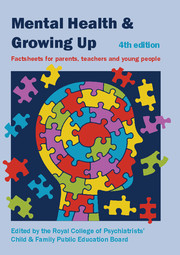Book contents
- Frontmatter
- Contents
- Contributors
- Factsheets for young people
- 1 Bipolar disorder
- 2 Cannabis and mental health
- 3 Cognitive–behavioural therapy (CBT)
- 4 Coping with stress
- 5 Depression
- 6 Drugs and alcohol
- 7 Exercise and mental health
- 8 Mental illness in a parent
- 9 Obsessive–compulsive disorder (OCD)
- 10 Psychosis
- 11 Schizophrenia
- 12 When bad things happen – overcoming adversity and developing resilience
- 13 Worries about weight and eating problems
- 14 Worries and anxieties
- 15 Who's who in child and adolescent mental health services (CAMHS)
- Factsheets for parents, carers and anyone who works with young people
14 - Worries and anxieties
from Factsheets for young people
Published online by Cambridge University Press: 02 January 2018
- Frontmatter
- Contents
- Contributors
- Factsheets for young people
- 1 Bipolar disorder
- 2 Cannabis and mental health
- 3 Cognitive–behavioural therapy (CBT)
- 4 Coping with stress
- 5 Depression
- 6 Drugs and alcohol
- 7 Exercise and mental health
- 8 Mental illness in a parent
- 9 Obsessive–compulsive disorder (OCD)
- 10 Psychosis
- 11 Schizophrenia
- 12 When bad things happen – overcoming adversity and developing resilience
- 13 Worries about weight and eating problems
- 14 Worries and anxieties
- 15 Who's who in child and adolescent mental health services (CAMHS)
- Factsheets for parents, carers and anyone who works with young people
Summary
How common is it?
Anxiety is one of the common mental health problems. Nearly 300 000 young people in Britain have an anxiety disorder. So you are not alone. Lots of people, however, suffer in silence. It is important to recognise your problems and seek help, especially when anxiety starts affecting your everyday life.
What does anxiety feel like?
When we feel we are in danger, our brains tell our bodies to get ready to run away quickly. This means that if you have anxiety you may feel this in your mind, as well as physically in your body.
Some of the most common symptoms of anxiety are listed below.
In your body you may feel:
• sick
• shaky/dizzy
• your heart racing
• short of breath
• ‘butterflies’ in the stomach.
In your mind you may:
• feel upset
• feel worried
• feel irritable
• feel unable to relax
• have difficulty in concentrating.
What different types of anxiety can I experience?
Anxieties are grouped based on what the fear or worry is about. Grouping is also helpful in understanding your difficulties and treating them.
Fears and phobias
You might remember being scared of the dark or insects when you were little. This is normal and as we get older, we usually grow out of these fears or are able to manage them without worrying too much about it. Sometimes fears about particular things (e.g. needles, animals) or places (e.g. darkness, heights) can be really strong and don't go away. They stop you from doing normal things and interfere or take over your life. These fears are called phobias. You may need extra help to cope with a phobia.
General anxiety
Some people feel anxious most of the time for no obvious reason. When it is really bad, it can stop you concentrating at school or having fun with friends and family. Sometimes feeling anxious and sad can go together. You may need help to be able to feel and cope better.
Separation anxiety
Separation anxiety is feeling worried or anxious when you are away from your parents/family/guardians.
- Type
- Chapter
- Information
- Mental Health and Growing UpFactsheets for Parents, Teachers and Young People, pp. 42 - 44Publisher: Royal College of PsychiatristsPrint publication year: 2013



